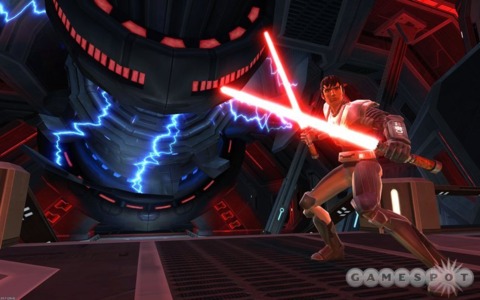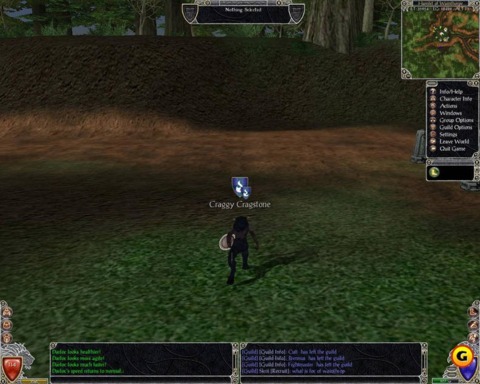Old Republic dev discusses massively multiplayer loners
GDC Austin 2009: Not everyone who plays MMO games plays well with others; BioWare designer Damion Schubert explains why developers need to cater to solo players as well.
Who Was There: Damion Schubert, BioWare's lead systems designer on the upcoming massively multiplayer online game Star Wars The Old Republic.
What They Talked About: Schubert's talk, titled "The Loner," looked at the various reasons players would want to play alone in massively multiplayer online role-playing games. Schubert said it's a question that has been asked increasingly in the MMO community of late, with the conventional wisdom being that MMORPGs were only for those willing to group with others.

Schubert said the philosophy was so ingrained that when he worked on Shadowbane, players who reached level 25 would have a big gray shield appear over their heads that told everyone else in the world, "Yes, please come and kill me. I have no friends that will come to my aid." That has shifted in the last five years, Schubert said, pointing to World of Warcraft and Free Realms as two games that have fostered solo play in the MMO field.
There are still multiplayer evangelists, Schubert said, who look at those who want to play alone as weird scary types, "like serial killers or that No Country for Old Men guy." Instead, he said developers should look at the solo players as using a more compelling archetype, like the Lone Ranger, at which point someone in the audience pointed out that the Lone Ranger had Tonto.
"Shut the hell up," Schubert good-naturedly retorted.
Schubert stressed that there is still a magic to massively multiplayer experiences, and all MMO games need them at some point since it's the genre's differentiating quality. Also, without that multiplayer feature, MMO games are competing on an unlevel playing field against traditional single-player games. MMO designers can work on combat, but they'll never match the God of Wars or Batman: Arkham Asylums of the world, Schubert said.
That said, Schubert specified that it is "unacceptable" to make an MMO game today that doesn't have a "significant chunk of gameplay" accessible to the solo player. He didn't suggest that everything be accessible to those playing alone, just that there needs to be something for all the different types of solitary gamers.
One type of loner Schubert talked about is "the new kid in town." Those players are a blank slate, he said, with no connections, no friends in the game, no clue. There's a unique social pressure to getting up to speed in any game Schubert said, and it's something a lot of people don't want to do with an audience there to mock them for every misstep. People instead need to be acclimated to the gameworld, he said.
He also talked about "the Hollow Earth problem," where the later in a game's life span you start it, the more likely you are to enter a long-since-abandoned area intended for lower-level players. In such places, it's easy for a solo player to get stuck when quests expect a number of lower-level players to team up to take on more-powerful enemies.
Schubert drew a parallel to casinos, describing them as a massively multiplayer environment where 70 percent of the revenue comes from the single-player options, like slot machines. And even in that single-player environment, Schubert said casinos have been designed to feel smaller and more social, a lesson MMO games should take to heart.

Then there are the sociopaths, people who don't understand or care about the social conventions of the space. Schubert said all new players start as sociopaths, and designers need to take them into account and bring them up to speed. For those who understand the conventions but don't care, Schubert said developers need to address them, whether it's by changing their behavior or simply removing them from the game.
Schubert said there were elements of roadway traffic that are parallels to MMORPGs, specifically in the way everyone else is depersonalized. Traffic engineers have found that drivers are less likely to cut people off if they make eye contact with them. Reducing anonymity like that makes it harder for people to treat each other with disrespect.
Some players want to play alone just because they can't group with others. People on a strict timetable, playing at unusual hours, or on a business computer may want to group but can't for practical reasons. It's important for those kinds of players to progress in hour or half-hour chunks of playtime where they can squeeze it in, Schubert said.
The introverted crowd is also huge for MMO games, Schubert said. The majority of adult gamers are introverts, he said, and forcing them to group is something they could find uncomfortable. The way around that is to put some sort of pressure on extroverts to make first contact or to allow introverts to advertise passively, such as posting their stats online and saying they're available rather than having to seek out groups and pitch themselves to them.
Another group of solo players that Shadowbane had a problem with were adrift gamers, those whose guilds had disintegrated or who are alone unwillingly. They want to be part of a guild, raid group, corporation, or whatever, but they're in a sort of limbo and in danger of abandoning the game entirely. Schubert said the answer is better tools to help people find the right group for them and to consider allowing multiple affiliations. Regardless of how designers address the issue, Schubert said they need to give players things to do while they are between groups.

Designers also need to take into account the casual people on the fence, those who want to be "part of the club" but are afraid they don't have the chops. Schubert said people want to be the key role in a big team effort but are terrified of being the weak link (the Bill Buckner of the raid, as he put it). To address that issue, Schubert said developers can ensure that casual players can compete with and get into the same recruiting pool as the hardcore players. The gap between the best of the best players and the casual ones should be "not nothing, but reasonable," Schubert said. Newbie-accessible roles (like cannon fodder, basically) that still provide value for the team are another way around the problem, he said.
Vacationers are another group Schubert said need to be considered with solo play. Sometimes gamers who are part of guilds and other groups want to explore the same gameworld, but on their own with a different character. Schubert cited studies that show the ideal commute to work to be about 20 minutes. For a number of people, that time alone in the car is the only time they get to be alone, to unwind between the pressures of home and the pressures of work.
There are also a number of commitment-phobic gamers who could benefit from solo play, people who don't want to make a long-term commitment or get sucked into guild drama. The emphasis some MMO games have on using voice chat is another barrier for the commitment-phobic.
Finally, Schubert said some people just want to be alone, and developers need to respect that. He brought up Habbo Hotel, a purely social massively multiplayer online environment, and mentioned that the developers classify a full 19 percent of users in that environment as loners.
Quote: "The irony of being alone in an MMO is inescapable. Being a loner is OK, but feeling lonely is not."--Schubert, on why even solo players care about a well-populated world.
Takeaway: People play massively multiplayer online games on their own for a slew of reasons. Developers can't cater exclusively to those people, but they should take them into consideration more. Forcing players to group is akin to a corner bar forcing people to watch sports, play trivia games, speed-date, or whatever other activities it offers, Schubert said. It's great if developers can get players to take part in those activities, but it can take time to convince them, and they need to be kept flying solo in the meantime.
Got a news tip or want to contact us directly? Email news@gamespot.com
Join the conversation